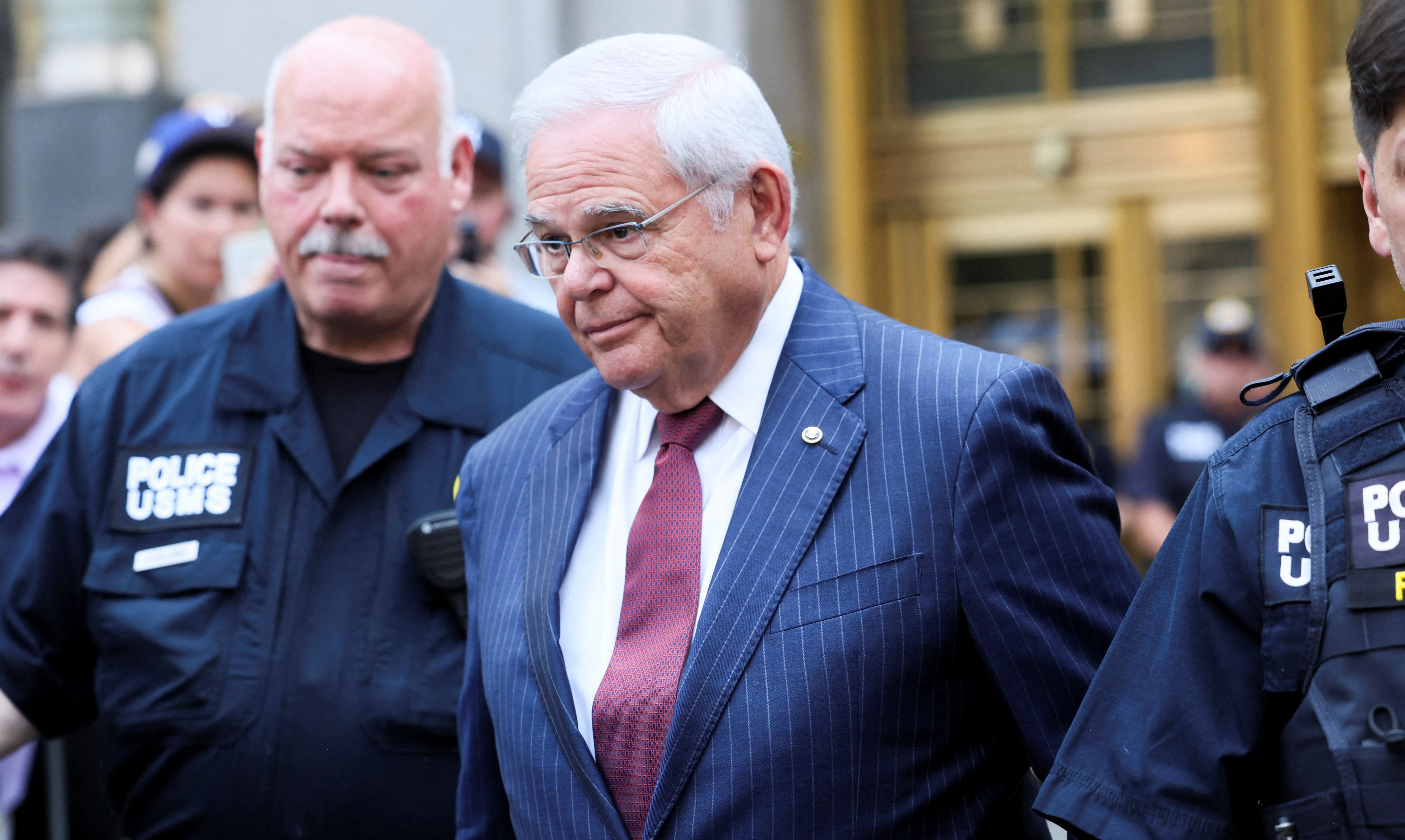Today, Sen. Robert Menendez (D-N.J.) became the first U.S. senator ever to be convicted of acting as an unregistered foreign agent. While serving as chair of the Senate Foreign Relations Committee, Menendez ghost-wrote a letter and approved arms sales on behalf of the Egyptian regime in exchange for bribes, among other crimes on behalf of foreign powers in a sweeping corruption case. An Egyptian businessman even referred to Menendez in a text to a military official as “our man.”
In a statement, U.S. Attorney Damian Williams said Menendez was engaging in politics for profit. "Because Senator Menendez has now been found guilty, his years of selling his office to the highest bidder have finally come to an end,” he said.
Menendez was convicted of all 16 criminal charges he faced, including wire fraud, bribery, and extortion. While he could technically serve out his Senate term, some Democrats including Senate Majority Leader Chuck Schumer (D-N.Y.) have already called on Menendez to resign. Currently, Menendez still serves on the Senate Foreign Relations Committee and could continue to be privy to classified intelligence. In response to the conviction, the Senate Ethics Committee announced it would consider “the full range of disciplinary actions.”
Menendez’s acts of corruption for several years while serving on a powerful foreign policy-making committee have some wanting the Department of Justice to investigate further illicit influence operations. "Senator Menendez's conviction today is an important step in accountability, but our government must do much more to investigate, root out and punish these naked acts of corruption and undue influence by Middle East dictatorships that are rotting our democratic institutions," said Sarah Leah Whitson, executive director of Democracy for the Arab World Now.
Menendez himself seemed to imply that other members of Congress may be engaging in similar acts, saying the jury’s verdict would put “at risk every member of the United States Senate in terms of what they think a foreign agent is.”
In addition to highlighting the need for rooting out illicit influence operations, the Menendez conviction should serve as a reminder that the legal foreign influence industry in the U.S. is thriving. Since 2016, foreign powers have spent more than $5 billion on perfectly legal influence operations reported under the Foreign Agents Registration Act (FARA), according to OpenSecrets. There are currently more than 2,300 registered foreign agents working in the U.S. right now, according to FARA records. And, they are sometimes working towards the exact same ends as these illegal operations.
Egypt’s influence efforts in the U.S., for example, extend well beyond Menendez and have been aided by high-powered lobbying and public relations firms that are legally registered to do this work. As Menendez was working to greenlight a $2.5 billion arms sale to Egypt Brownstein Hyatt Farber Schreck, the firm representing Egypt’s Ministry of Foreign Affairs, was working to defeat an effort from Sen. Rand Paul (R-Ky.) to prohibit the arms sale to Egypt. As we discussed in a recently published Quincy Institute brief, FARA records show that Brownstein exchanged several emails and phone calls with congressional staffers regarding “Rand Paul resolutions on Egypt.” When the vote failed, Brownstein then helped coordinate an op-ed in Newsweek on behalf of Egypt’s ambassador which praised Congress for “aircraft and military hardware that will allow Egypt and the U.S. to undertake missions in the interests of both countries.”
Similarly, Azerbaijan’s illicit influence operations in the U.S. have been working towards many of the same ends as the country’s legal lobbying and influence efforts. Representative Henry Cuellar (D-Texas) was indicted in May for allegedly taking at least $360,000 in bribes from companies connected to the government of Azerbaijan in exchange for pushing U.S. foreign policy in Azerbaijan’s favor.
According to the indictment, “Cuellar agreed, among other things, to influence a series of legislative measures relating to Azerbaijan’s conflict with neighboring Armenia.” Meanwhile, Azerbaijan’s lobbyists regularly distribute letters and talking points and, generally, work feverishly to maintain the flow of U.S. military assistance to Azerbaijan. According to FARA records, they’ve been in regular contact with Cuellar’s office to pursue these and other ends on behalf of Azerbaijan.
Cuellar’s trial is slated to begin in the spring of 2025.
While the conviction of Menendez is undoubtedly shocking, the gold bars, luxury cars, and outright bribes in this story shouldn’t blind us to the fact that there is a perfectly legal foreign influence industry in the U.S. that is working, every day, to bend U.S. foreign policy to the whims of foreign powers. Our research has found that those foreign powers are usually authoritarian regimes, like Egypt, and they’re usually pushing U.S. foreign policy in decidedly militarized directions — promoting arms sales, U.S. military bases abroad, and direct U.S. military involvement in foreign conflicts. That should alarm us as much as any senator illegally on the take.
- Foreign bribery in Congress: 'The way business is done'? ›
- Donors to Dem senator's legal defense linked to ex-terror group ›
- Menendez's New Jersey: Global power hidden in plain sight ›
- Apparently, Azerbaijan’s got plenty of agents in Washington | Responsible Statecraft ›
- Sue Mi Terry: Sometimes you get whacked by the revolving door | Responsible Statecraft ›
















